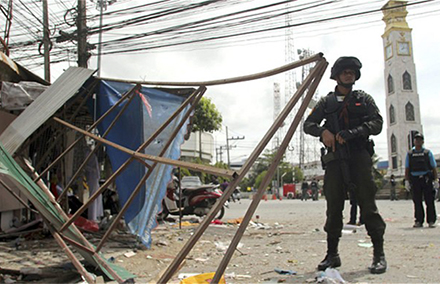
Thai soldiers and police officers at the scene of a bomb attack in Pattani province, southern Thailand Photo: EPA.
The Bangkok blast has thrown the spotlight on Thailand’s Deep South – a place where terrible violence is all too common.
As the world focuses its attention on the horrific blast at the famous Hindu Erawan shrine located in the middle of busy Bangkok, the nearly forgotten three southernmost provinces of Thailand (Yala, Narathiwat, and Pattani) have finally started to get worldwide media attention. Malay-Muslim insurgents from the south are suspects in this deadly bombing incident.
But few news reports have mentioned people’s lives in the lower south. For more than a decade people in the southernmost region of Thailand have been regularly exposed to bombs. In the wake of this horrible incident there is an opportunity to do some good, by raising awareness of the chronic violence in Thailand’s southernmost region.
I don’t seek to rationalise what happened at the Erawan shrine or to adjudicate who suffers more than who. Instead, I want to give voice to the suffering in southern Thailand, and ensure that its people are heard.
The blast in Bangkok on 17 August was by far the deadliest bomb attack in Thai history. Whoever the perpetrator, the attack was meant to cause a high level of casualties. In contrast, the violent situation in Thailand’s south has been called low-level by many.
But the violence that has happened almost every day for the past 11 years should not be downgraded as insignificant.
On 4 January, 2004, a group of unidentified gunmen attacked the military base in Narathiwat. The incident marked the beginning of a decade of violence. Today, the death toll exceeds 6,200, with more than 14,450 injured (www.deepsouthwatch.org).
During my PhD fieldwork in southern Thailand, I interviewed a woman in her 60s who had polio as a child and also takes care of her 90-year-old, half paralysed father. She told me she was once shot in her disabled leg and chest right in front of her house. Luckily she survived.
Another time, a shooting rampage by unidentified armed men ravaged her house. Fortunately no one was hurt. She showed me bullet holes along the walls.
I asked her why she didn’t leave the area. In tears, she answered, “This has been my home since I was born. Where else can I move to?”
While Thailand’s military government has tried overly hard to bring back happiness to the whole country, the southernmost provinces of Thailand rarely experiences joy.
There were lots of free haircuts and free concerts. Lots of money paid to victim’s families, lots of catfish given out to villagers. But no peace or light at the end of the long tunnel of separatist strife. In fact, the region has not experienced “happiness” as much as “agony”.
There has never been a substantive policy to help sustain peace in the southern region of the country, and the military has failed to solve conflict in the region. How can they solve conflict that is now happening at the national level?
For the most part, the worldwide community and people elsewhere in Thailand ignore the ongoing violence in the south. In the film Hotel Rwanda, Paul, a Rwandan hotel manager, talks with Jack, a Western photojournalist, about the local atrocities.
Paul expected an intervention from international humanitarian organisations. Jack disabused him of this thought.
“I think if people see this footage they’ll say, “Oh my God that’s horrible,” and then go on eating their dinners…”
People in Thailand need to stop eating their dinners and pay more attention.
What lesson can Thailand learn as a whole from the ongoing violence in the lower south? Settling conflict is not about suppressing and forcing everyone to speak and think the same, for that would create perpetual violence.
Restoring peace in the nation requires compromise between those who think and speak differently. It can be initiated by bringing every stakeholder to the same table, to discuss and negotiate for the best solutions.
At the moment, there is a peace process taking place in the lower south. The initial steps were promoted mainly by local civil society.
To work, a strong political will from both the Thai authorities and the insurgent groups is crucial. Sincerity from both sides is also needed. The peace process will be a long haul. But at least the local people in the lower south have made an effort to start.
When the deadly bombing incident happened at Erawan shrine, the people in the south prayed for Bangkok. Likewise, they also wish to see the same reaction in return from the whole country.
When the Thai people furiously urged the government to find the culprit behind the deadly bomb attacked, the government responded promptly. Likewise, people in the southernmost provinces of Thailand wish to see the same energy from the government when there is violence in their region.
People in the south are also part of the country. They are not secondary citizens.
Daungyewa (Hong) Utarasint is a PhD student in the Coral Bell School of Asia Pacific Affairs, the Australian National University. Her research examines electoral politics and voting behavior in Southern Thailand.
 Facebook
Facebook  Twitter
Twitter  Soundcloud
Soundcloud  Youtube
Youtube  Rss
Rss 